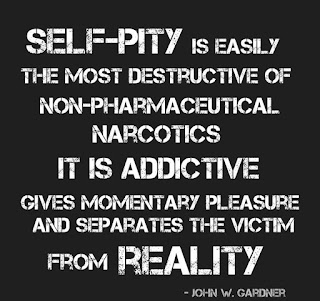13 Things Mentally Strong People Don’t Do: Don't Waste Time Feeling Sorry for Yourself
In this post let me share with you the first healthy habit of mentally strong people and one of my favorite based on Amy Morin's book "13 Things Mentally Strong People Don't Do."
(1) They Don’t Waste Time Feeling Sorry for Themselves
 |
| Image courtesy of Pinterest |
Self-pity party. Sadness is a normal healthy emotion but dwelling on your sorrow is self-destructive.
Can you relate to any of these examples:
You tend to think your problems are worse than anyone else’s.
Problems seem to add up to you at a rate faster than anyone else.
You’re certain that no one else truly understands how hard your life is.
You’re most likely to tell people what went wrong rather than what went well.
You often complain about things not being fair
Self-pity can consume you until it changes your thoughts and behavior, but you can choose to take control. Even if you cannot alter your circumstances, you can alter your attitude.
Feeling sorry for yourself is a waste of time. It requires a lot of mental energy without solving the problem.
It can steal your progress from healing and moving forward, it keeps you from accepting the situation for what it is.
It causes you to overlook what’s good in your life. When you feel sorry for yourself, you’ll miss out on the positive aspects of your life.
You can choose to have a survivor mentality than be the victim.
Instead of feeling pity for what you lost, choose to be grateful for what you have.
Volunteer for a worthy cause. Perform a random act of kindness. Do something active - exercise or read a book.
Replace thoughts that encourage self-pity. Almost every situation have their silver linings.
Self-Pity: I deserve better.
Gratitude: I have more than I deserve.
Here are some simple habits that can help you focus on what you have to be grateful for:
Keep a gratitude journal. Every day write at least one thing that you’re grateful for. Simple pleasures like good weather, your bed, or your work.
Say what you are grateful for.
Shift your focus when you start feeling self-pity.
Ask others what they’re grateful for.
Gratitude impacts your psychological and physical health. A 2003 research study found that people who feel gratitude don’t get sick as often as others. They have a better immune system, lower blood pressure and exercise more. They take better care of their help, sleep longer and report feeling more refresh upon waking. People who are grateful experience more happiness, joy, and pleasure on a daily basis. Gratitude improves social life. Grateful people are more willing to forgive. They feel less lonely and isolated and more likely to help others.
What’s helpful?
Giving yourself a reality check, so you avoid exaggerating how bad the situation really is.
Replacing overly negative thoughts about your situation with more realistic thoughts.
Choosing to actively problem solve and work on improving your situation.
Getting active and behave in a way that makes you less likely to feel sorry for yourself.
Practicing gratitude every day.
What’s not helpful?
Allowing yourself to believe that your life is worse than most people.
Indulging in exaggerated, negative thoughts about how difficult your life is.
Remaining passive about the situation and focusing only on how you feel rather than what you can do.
Declining to participate on experiences and activities that can make you feel better
Staying focus on what you don’t have than on what you do have.

Comments